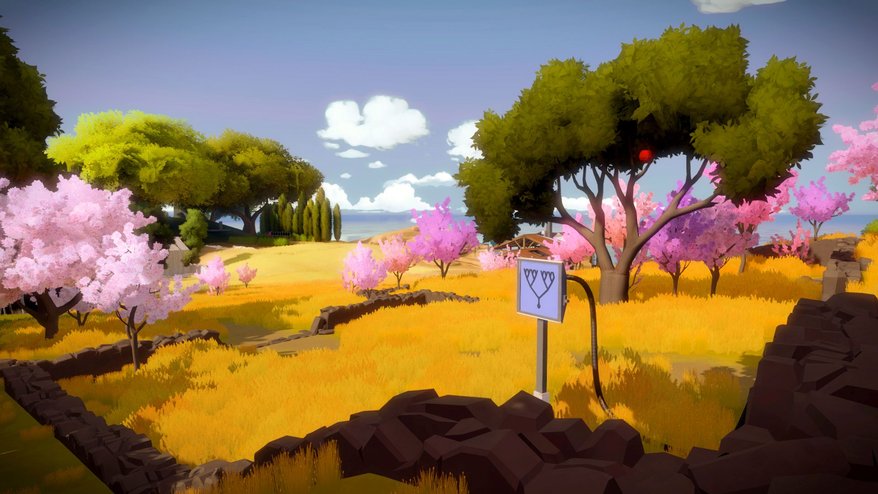I went into the Witness a bit biased. Biased, not because I was spoiled on some part of the plot (what plot?), but because of certain negative reviews and some negative feedback from friends. However, Dr. Random, rather easily, talked me, or bought me, into trying the game and I was immediately hooked! Approximately 500 puzzles later I emerged from the rabbit hole this game had driven me into and I was filled with the desire to keep exploring, to keep on digging a little deeper. In short this game speaks directly to the heart of the researcher!
If you haven’t been paying attention to the gaming world lately, The Witness is the new game by Jonathan Blow, developer of the famous and praised Braid. It is an open world/sandbox first person puzzle game set in an, apparently, abandoned island. The puzzles are iterations of the same idea which is a square with blocks, asking you to draw a line between them from point A to point B. Progressively the conditions under which you have to connect A to B are getting harder to the point that you would much rather bang you head against a wall instead of figuring out how to fit 4 different Tetris puzzles in your drawing, while separating 3 different colored blocks and 2 stars.
At that point I could understand the negative criticism this game has taken, which, to be fair is not that much. The game sells like a hot pie, even with the controversy over its pirated version. However I can see some of the negative points. It does get extremely frustrating to solve virtually (pun intended) the same puzzle 15 times. The game itself boasts about the fact that it has over 500 puzzles – which probably does not even include the open world ones. The complete lack of music can also be kind of annoying, but I did enjoy the beautiful ambient sounds of each area and how well they were tied in with the amazing environment.

In short, the game is big and beautiful. However, in this brief post I want to make a different point for why this game is great (minor spoilers incoming). After investing several hours into figuring out other possibilities than the “soft ending” of the game, I realized there was something that drove me forward despite the virtual (I keep doing this) dead-end; the desire for research. And then it clicked, all I had been doing throughout the game was research. I was trying, by solving minor puzzles, to put together a seemingly inexistent story. I was thrown into a world knowing absolutely nothing and I kept acquiring knowledge both on how to solve the puzzles and how to understand this world.
It might seem like it stretches the definition a bit, but playing The Witness felt a lot like excavating. Every time something new came to light I had to remember where I had seen similar stuff. I had to connect the dots, literally and metaphorically, in order to progress. The fact that there was no clear linear path to follow but I could go anywhere only enhanced this feeling. If I was in an area with a puzzle mechanic I had never seen before, I had to dig around to figure out where the tutorial of this mechanic was located. I had to find the source of this knowledge in order to make sense of it. In a similar fashion, in excavation, or in academic research you always encounter things that you don’t know and you always have to look back, go back to what you know (or should know) and get the information you need in order to progress forward.
In the end I managed to get all the video footage spread in this abandoned island and find an alternative ending to the game, which was much more explanatory that the soft ending (no more spoilers to be had here). Immediately after, I jumped on the internet forums, on reddit, twitter, anywhere, to find other people’s opinions on the game, its meaning and its story. The research had to keep going!
Lately VALUE has been working on some very cool stuff which has got me thinking a lot about video games and their possibilities to expand or change our historical and archaeological understandings through different forms of narrative offered by this interactive medium. The Witness made me realize quite a few things about the potential video games have for changing our perspective on research and the past. I am planning to do a more in-depth post on research, education and possibilities in sandbox puzzle games. This Games We Dig is, hopefully, a teaser of a more detailed analysis of this concept! For now, I really wanted to share the idea that games can actually make us do research without realizing it. I’d love to get your feedback on this via Twitter or Facebook!
